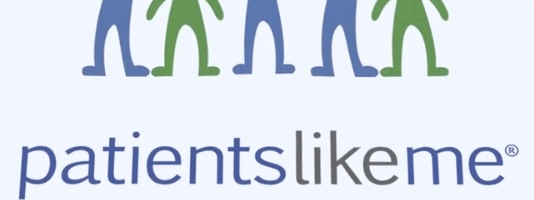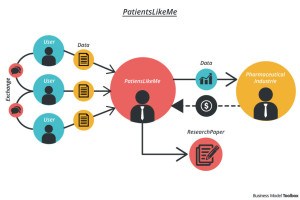PatientsLikeMe: unquestionably successful, but only one misstep from disaster

No one can deny that PatientsLikeMe is a success story. From its humble beginnings as an online community for patients living with ALS, PatientsLikeMe has grown to be the largest social network and patient community online. The numbers recorded for the “not-just-for-profit” company are astounding: over 300,000 members who have entered data about 2,300 diseases, $32M of investor funding to date, and 4 key Fortune 500 business partners in 2015 alone. Like other social network sites, the success seems to only accelerate overtime.
Before we declare PatientsLikeMe the winner, let’s take a look under the hood of how this company operates. First and foremost, the company operates as a “patient community” platform. Patients log onto the website to compare and discuss their disease and treatment with others like them. Users enter real-world data on their conditions (treatment history, side effects, hospitalizations, symptoms, etc), and can compare their results to others in the community. Beyond the dashboards, they can chat with others in discussion forums to share experiences. Overall, this becomes a powerful platform for people wishing to seek support during an often-difficult time in their life. PatientsLikeMe was, and is, simply better at providing this support then many other options out there.
To earn revenue, the company (as outlined in a back section of its website):
“We take the information patients like you share about your experience with the disease and sell it to our partners (i.e., companies that are developing or selling products to patients). These products may include drugs, devices, equipment, insurance, and medical services.”
Click to enlarge. Source: http://bmtoolbox.net/companies-and-stories/patients-like-me/
Overall, the company has been a runaway success and a textbook example of both direct and in-direct network effects. By being the best platform, patients came to the site to share their information. The more information they shared, the more valuable the platform became for each user. This data was unquestionably valuable to 3rd parties (i.e. pharmaceutical companies), who have purchased the data. Indirectly, patients may benefit in the long-run as drugs and products are created which better meets their needs. Move over Google, a new player in town has looked at your core data selling business model and found a new use!
However, before we sit back and praise digital innovation as the saviour of the healthcare industry, lets take a little walk through history. Patients and pharmaceutical companies have had a difficult marriage over the last 30 years. To be clear, both need one another and, at the core, both win when each is successful and well served. However, in the past this marriage has gone through good and bad years. Great years have included the collaboration of groups such as the Cystic Fibrosis Foundation and Vertex Pharmaceuticals in the development of life changing medicines. Difficult years have included the AIDS Healthcare Foundation protesting the prices of HIV medication from Gilead Sciences. At the core, these conflicts occur because the incentives of the pharmaceutical and patients can be misaligned. Patients wish for their disease to be cured, and for that cure to come to everyone. Pharmaceutical companies seek for the same outcome, but also need to return profits to shareholders. If profits and patients are in tension, we find issues.
As PatientsLikeMe moves forward they need to be careful to keep one eye to the past. One misstep in how patient data is used could cause all trust with the site to be lost: one unaffordable drug launch praising PatientLikeMe data, one data breach, one rouge partner could cause the whole stack of value to collapse. For now, no major scandal has been revealed, but this risk increases exponentially as more partners are brought on-board.
As PatientsLikeMe loudly celebrates the number of “data partners” they have signed in 2015, they should quietly work furiously to beef-up their due diligence, monitoring, and PR teams.




Super interesting post. I think you’re right that PatientsLikeMe need to be careful with their use of patient data and definitely keep an eye on the past, but even if one of those (very plausible!) scenarios you mentioned occurs, I don’t think patients would feel they have lost value by participating on the site. In my opinion, patients go on the website to share a burden they can’t share with others close to them and genuinely connect with people going through the same thing. That is the value to them. A side benefit is the possible for improvements in medicines, diagnostics, and devices from their shared data, but a lot of these patients know that these improvements likely may not come in their lifetime, and I think they are okay with that.
PatientsLikeMe is also pretty upfront about how they use and share patients’ health data and encourage patients to support their endeavor to do so. The potential for personalized medicine is huge – companies can see what types of patients respond well to which types of treatment and can customize treatment plans, consciously select types of patients with higher probabilities of success for their clinical trials, and conduct a number of other good, semi-good, and questionable actions. That being said, PatientsLikeMe promises to de-identify, anonymize, and aggregate all patient data before selling it to companies. Recent allegations suggest that PatientsLikeMe are using tools to collect patient names and other information, which is obviously completely unethical and terrible. However, patients are still uploading data to the site and flocking to it, which suggests they derive a benefit from the website that goes beyond the potential for better treatment – genuine human connection and support.
Great post & cool company. I’m curious how representative this data is of each overall patient population, particularly for chronic diseases given the online platform inherently caters to a tech savvy crowd. Also, because of the strong network effects, certain conditions and symptoms may be overly represented and not indicative of the broader disease profile. It would be useful to both the patients and the pharmaceutical companies to clearly show who and what might be missing from the data.
Well written and great insights. I completely agree with you that PatientsLikeMe has built a powerful network platform based on a surprising amount of trust extended to them from their users. I mean, people are usually rather reluctant to discuss their medical ailments with many people, much less with complete strangers and then allow that data/conversation to be shared with those willing to pay…. but, when these folks buy into the mission of what PatientsLikeMe is built around, the entire paradigm shifts.
Again, I agree that a breach of this trust would be a potential deal breaker for this company. But, I also believe that the more likely disrupter of their business model is a digital chronic (or acute) care management platform that offer medical and clinical support/solutions AND offers the community aspect as a feature of their platform. In this case, there will be an even stronger network effect because there will be multiple entry points to end up on the platform.
Overall, this is an extremely exciting space to watch!